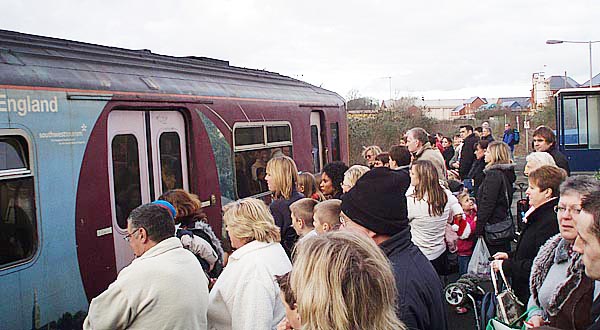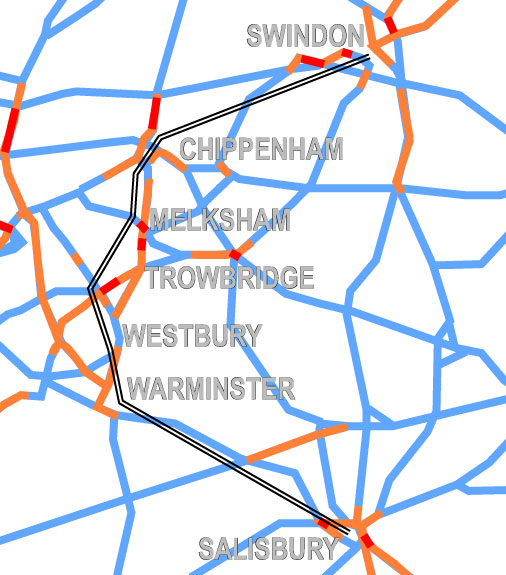An opportunity to provide an appropriate service once again.
March 2008, prepared by Graham Ellis of "Save the Train", Melksham.
Overview
There's an opportunity to restore an appropriate train service - a backbone of fast public transport - across Wiltshire - with other major benefits too from this coming December. The cost has fallen dramatically since the "Save the Train" campaign started, and it's now a "no-brainer" that is should be done.
I can report full support from all three major party candidates for the new marginal Chippenham constituency, other MPs across the county, and almost everyone else I talk to. I have discussed the matter with First Great Western at CEO level and in more detail at a managerial level, and a huge amount of real background work has been done to make it happen.
Please can I ask YOU for your support ....
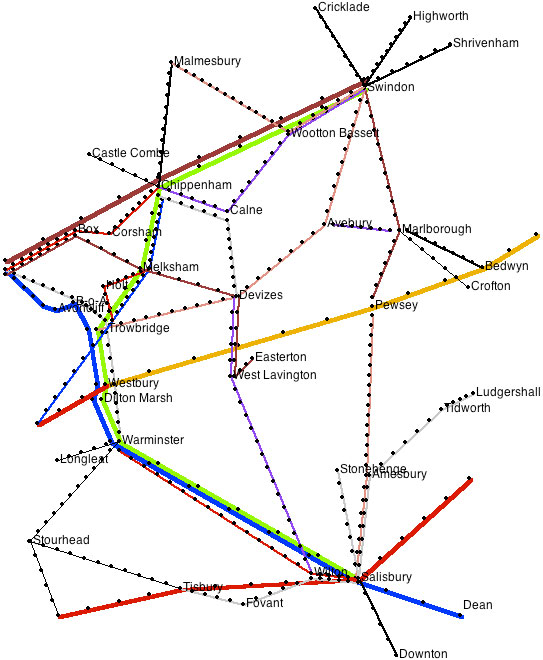
Geography
Current North / South train services
On this public transport map, 1 dot represents 3 minutes travel time. The fewer dots, the quicker! Salisbury to Swindon - 2 hours by bus, 1 hour by train
Swindon and Salisbury are the two largest towns in Wiltshire - a largely rural count until recently. They are 40 miles apart, but separated by the high ground of the Marlbrough Downs and Salisbury plain. The next three towns in size are Chippenham which is in the North West of the County, and Trowbridge (the county town) and Melksham which are both in the West of the county.
Travel options East - West are excellent, with three major railway lines with regular services crossing the county, and major trunk roads (M4 and A303) at the North and South.
In the east of the county, North - South travel options are limited; none of the roads is in any sense up to fast modern trunk standards, and in any case the areas being connected are sparsely populated.
In the West of the county, there is a strong call for North - South travel, with the A350 road via Chippenham and the A36 across from Bath to the North West both carrying trunk flows to the Westbury / Warminster area, where they coincide onto the A36 on to Salisbury. Goverment figures show that both roads from Warminster to the North are heavily congested.
A rail line runs from Salisbury via Warminster, Westbury and Trowbridge to Bath then on to Bristol. South of Westbury, the service was also reduced in December 2006 and further reduced n December 2007. It is now hourly, with some extra services. North of Westbury, there are two trains per hour to Bath and Bristol. Trains on this line are heavily overcrowded, with passengers regularly being denied boarding at traditional peak times, and also at weekends; it is rarely quiet.
The former Swindon to Salisbury service (which carried on to Southampton) ran via Chippenham, Melksham (which was served only by these trains) and Trowbridge to Westbury, Warminster, Salisbury, Romsey and Southampton. The replacement service runs only from Swindon to Westbury (according to the franchise document) although in practise the same train carries on southbound from there to Salisbury at 07:02 and 19:40.
West Wiltshire (the towns of Trowbridge, Melksham, Westbury and Warminster all of which are on the Swindon to Salisbury railway line), and Chippenham, Swindon, Salisbury and Frome (10 minutes from Westbury by train connection) are all growing rapidly, and that planned growth is planned to continue under the Regional Spatial Stregy. The town of Bradford-on- Avon (on the route to Bath and Bristol) is not forcast for such high growth, although it will grow somewhat.
History
This report studies the options for an improved train service from Salisbury to West Wiltshire and Swindon. The through service along this corridor grew rapidly from its introduction in 2001 by Wessex Trains through to the end of their franchise on 31st March 2006.
Under the terms of the new franchise, awarded to the First group, the service was withdrawn in December 2006. This is in spite of growth figures between 10% (FGW) and 35% per annum (ORR) compound for those five years. The SRA reports which preceeded the new specification used a growth forecast of 0.8%, which resulted in a blossoming service which had moved from a rural backwater in 2002 to busy trains in 2006 being lost.
First now run just 2 trains a day along part of the line - round trips from Swindon at a quarter past 6 in the morning and a quarter to 7 at night, when the stock that serves the Stround Valley line isn't actually needed there and can be loaned to the "TransWilts". According to First's press release last week, this is "hardly an attractive proposition" for passengers.
Travel flows
There is major London commuter traffic flow from Swindon, Salisbury, and Chippenham by rail; those services are run by different rolling stock sets and are outside the scope of this study, which is looking at North - South and related requirements. These include:
1. Commuter traffic from West Wiltshire to Bath and Bristol
2. Commuter traffic from West Wiltshire to Chippenham and Swindon
3. Commuter / school traffic from Westbury / Dilton Marsh / Warminster to Salisbury
4. Traffic from Salisbury and beyond (Hampshire and Southampton) to West Wiltshire, Bath, Bristol and Swindon
5. Traffic to the county records office in Chippenham from elsewhere in the county
6. Long distance travel from Melksham to anywhere
7. Travel from Trowbridge to London
8. Travel from Somerset (Frome, Yeovil) and Dorset (Dorchester, Weymouth) to Chippenham and Swindon, Bath and Bristol.
9. Tourist journeys to / from Salisbury and other attractions in the county such as Longleat [Warminster] , Stonehenge [Salisbury], Avebury [Devizes / Swindon], Lacock [Melksham] and Bowood [Chippenham] and out of the county to Bath to the West and Oxford to the North East - beyond Swindon.
Comment on current traffic flows
a) Public Transport travellers along the Salisbury - Bath corridor are frequently overcrowded onto trains. Particular "pinch points" identified are Trowbridge to Bath, and North from Salisbury where many ongoing passengers arrive from Southampton and Exter and Andover directions on South West Trains and have to crowd into the hourly service to Westbury.
b) Travellers from South and West Wiltshire to Chippenham and Swindon have to use the same overcrowded trains from Salisbury / Trowbridge to Bath, doubling back there to complete their journeys to Chippenham and Swindon.
c) Travellers from Westbury / Dilton Marsh / Warminster to Salisbury have a limited choice of services with trains reversing at Warmister where previously they continued to Salisbury.
d) Travellers from Melksham have no practical train service for the most part - the few trains that run are too early or too late for long distance journeys, and the services offered provide a commuter arrival in Salisbury at 07:30 with a departure back at 19:00, or an arrival in Swindon at 07:45 with a return at 18:45 - both of which are too long a day.
e) Good local bus services are provided, but recently routes such as the Swindon - Salisbury, Chippenham - Bristol and Bath - Salisbury have been fractured into separate sections with a change of vehicle and operator often necessary, sometimes at a remote spot.
f) There is no direct bus service from either Chippenham or Melksham to Salisbury, Warminster or Westbury.
g) Due to the nature of the roads in the county, longer distance bus journeys are slow. It takes 2 hours from Chippenham or Swindon to Salisbury, and 95 minutes by express route 49 from Trowbridge to Swindon (v 35 to 40 minutes by train, at 07:06 or 19:40 ONLY)
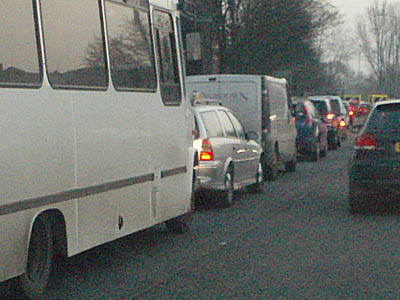 Traffic on the A350 approaching Melksham (December 2007) |
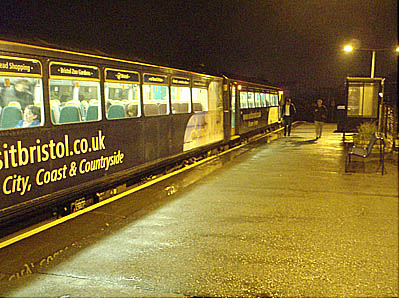 Melksham Station - the 18:45 from Swindon (December 2007) |
What is an appropriate service along the "TransWilts" corridor?
A great deal of work has been put in by professionals working for the local transport authority, the train operators, and other bodies, on this subject. There is agreement from all parties that an appropriate service would run much more frequently, and provide good ongoing linkage and connections.
An additional hourly train service from Salisbury (and perhaps beyond if it could join onto the service from Waterloo or Southampton) to Swindon is perhaps the ideal, providing an increase to half hourly from Salisbury to Westbury and Trowbridge and then a clockface onward service to Melksham, Chippenham and Swindon. Realistically, such a service is unlikely to be achieved in the short term due to rolling stock shortages and line capacity issues between Trowbridge and Chippenham, where the line has been reduced to a single track.
What can be realistcally achieved?
There are three options which would be realistic and which would meet many of the passenger flows, requirements of the area and aspirations in the short term; where it would go in 5 years if we see double figure growth year on year is an intersting question.
a) Retain the existing two trains, and provide extra services from Salisbury to Swindon and back every THREE hours during the day - so that would be Swindon arrivale at 08:45, 11:45, 14:45 and 17:45 with return departures a few minutes thereafter
b) Provide extra through services from beyond Salisbury to Swindon; logically, such services would be operated by South West Trains from their Salisbury depot, and with current turn around times at Salisbury being quite generous, a single additional unit could provide a two hourly service.
c) As option (b), but with all South West Trains extended - alternately to Swindon and to Bristol. This would take just two additional Salisbury based units.
Option (a) - three hourly service
The operator would be First Great Western, who have done a great deal of background work including timetable and staff validation. Due to their publicly acknowledged tight rolling stock issues, there is a question mark over the provision of the critical train at 16:20 from Salisbury / 17:50 from Swindon, without which the scheme would NOT fully meet travel flow requirements 2, 3, 4, 5, 6, 8 and 9.
With the 16:20 / 17:50 round trip, further travel flow requirments would be satisfied, although elements 3 and 4 would only partially be met - really an issue in the south of the county, where the option (a) provides neither a regular halfhourly service south of Warminster, nor a cross-Salisbury service to Chippenham / Swindon.
Option (a) would also provide improves service for Frome (in Somerset) - 2 additional trains per day which would break up the 3 hour gaps at present to that town of about 25000.
Finally, option (a) would provide some overcrowding relief on the Trowbridge to Bath section, where things are so bad at the moment that travellers are denied access at times. This is because the "dogleg" travellers who use this service at present to get from West Wiltshire to Chippenham and Swindon would no longer be on these train.
Option (b) - two hourly service
It would be logical for a cross-Salisbury service to be operated by South West Trains. This more frequent service would provide would provide an improve solution compared to option (a) for most travel flows. It would NOT provide additional service for Frome (although if the service stopped at Dilton Marsh, the extra train FGW shuttles to Warminster could be released to do so, DfT permitting).
It is noted that South West Trains crews already have route knowledge to Trowbridge.
Option (c) - two hourly to Swindon, two hourly to Bristol
All issues are logically dealt with, providing a full cross-Salisbury service and a half hourly train on from there to Trowbridge. There is further scope for detailed work on the extra Bristol runs as numerous other issues could be resolved (where would it stop? 2 trains per hour Keynsham to Bristol?)
Costing notes
These are edited on the public record for commercial/confidence reasons!
1. First Great Western suggest that xx xxxxx xxxx xxx xxxxx is needed xx xxxx xx run the services in option (a) comprising xxx xxx xxxxxxxxxx xxxxxxx xxx xx xxxxxx, and xxx to make up for xxxxxxx xxxxxx. xx xxxxx xx xxx xxx xxxxxxx xxxxxxxxx, x xxxxx xxxxx xxxxxxxxx xxxx xxxxxxx xxxxxxxxx xxx xxxxxxxxxxx xxxx xxxxxxoxxx xxxxxx xxx xxx xxxxx xxxxx xx xxxxxxxxx - xxxx xxxxxxxxx xxxxx, xxx xxxxx "ORCAT" xxxxxxx xxxxx xxxxx xx xxxxxx xxxxxx xxx divided in proptortion to the number of trains, xx xxxx xxxxxxxxx.
2. The SWT trains options would xxxxxxxx xxxx x xxxxxx xxxxxxxxx xxxxx xx xxxx xx xxxxx xxxxxxx xx xxxxx xxxxxxx. xxxxxxx - both options (b) and (c) would be xxxxxxxxxxxxx xxxxxxxx xxx xxx xxxxxxx xxxxxxxx under ORCATS xxx xx xxx xxxxxxx xxxxxxx xxxxx xx xxxx xxxxxxxxxx xxxxxx xxx xxx xxxxxxxxx
3. There is scope for fare INCREASES on fares via Melksham which are currently unusually low. A rise of the order of 75p per local journey if accompanied by the provision of an appropriate service would be in order. At a traffic level of 150000 journeys per year (which we know would be reached based on historic data of where things were headed when the service was cut) this would xxx xxxxxxxxxx xxx xxxxxx xxx xx xxxxx.
Comment on traffic levels
From 2001 to 2005, ticket sales grew from 3,000 to 27,000 at Melksham (of which an estimated 20% were not actually for Melksham travel - so the true numbr was around 20000) and adding in through passengers, first reported around 120,000 journeys in the year. That is a compound growth rate of over 20% per annum. Under the new timetable run in 2007, we estimate that under 10,000 journeys were made on the line.
* With a service that meets most of the identified flows, and that is reliable and reasonably priced, there is no reason that passenger journey number should not return to prior levels.
* Ticket sales in Melksham, even at the height, were an order of magnitude lower that sales at the neighbouring town of Bradford on Avon, which is half the size but enjoys a much better service. Both towns have a heacy exodus of peopel to work in the morning - to Swindon, Chippenham, Trowbridge, Bath and Bristol from Mleksham - so traffic from there / ticket sales could continue to grow to ne many times that of the previous peak level.
* Westbury, Warminster, Trowbridge and Melksham will all grow significanty under the Regional Spatial Strategy, with a major commuting requirement to Chippenham and Swindon.
* With the new unitary authority in Wilthshire, the county's third town of Chippenham and fourth town of Melksham will require a fast public transport access to the county town and the county's largest population centre at Salisbury.
* New developmenst such as the county records office at Chippenham (opened since the train service was effectively discontinued) are isolated from the county they serve by public transport
* There are proposals to improve the current North / South trunk road that parallels the railway in the Westbury area, but the road is already cogested to the extent of delaying traffic elsewhere - at Yarnbrook, North Melksham, Beanacre and around Chippenham and further improvements there are not yet on the radar. Congestion will encourage further rail use.
* The railway's earthworks are suitable for double track provision, and there is also scope for the provision of a link line to allow a Chippenham - Melksham - Bradford-on-Avon - Bath - Bristol service in the future.
* Westbury and Trowbridge stations are being improved at present to encourage more passengers. There is major scope to develop Melksham station, which is close by the main road used by many buses, as a public transport and cycle interchange. Land is already earmarked for improvements which would make it the hub of an integrated system rather than have it winning the Campaign for Better Transport's least accessible station award again like it did last year.
* Community groups such as Save the Train, the Melksham Railway Development Group, the Town Council, the District Councils, West Wilts Rail users group, More Train Less Strain, and many other are in full support.
* I cannot predict just how quickly a 1 or 2 coach train would reach capacity - but it wouldn't be many years at all ...
